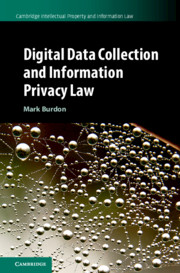Book contents
- Digital Data Collection and Information Privacy Law
- Cambridge Intellectual Property and Information Law
- Digital Data Collection and Information Privacy Law
- Copyright page
- Dedication
- Contents
- Figure and Tables
- Acknowledgements
- 1 Introduction
- Part I The Collected World
- 2 The Smart World Is the Collected World
- 3 The Smart Home: A Collected Target
- 4 Commercialising the Collected
- Part II Information Privacy Law’s Concepts and Application
- Part III Information Privacy Law for a Collected Future
- Bibliography
- Index
- Cambridge Intellectual Property and Information Law
2 - The Smart World Is the Collected World
from Part I - The Collected World
Published online by Cambridge University Press: 04 April 2020
- Digital Data Collection and Information Privacy Law
- Cambridge Intellectual Property and Information Law
- Digital Data Collection and Information Privacy Law
- Copyright page
- Dedication
- Contents
- Figure and Tables
- Acknowledgements
- 1 Introduction
- Part I The Collected World
- 2 The Smart World Is the Collected World
- 3 The Smart Home: A Collected Target
- 4 Commercialising the Collected
- Part II Information Privacy Law’s Concepts and Application
- Part III Information Privacy Law for a Collected Future
- Bibliography
- Index
- Cambridge Intellectual Property and Information Law
Summary
Chapter 2 provides an overview of smart technological developments covering three areas: smart individuals; smart buildings; and smart environments. A key element of smartness across all these areas is sensorisation and the rapid spread of sensorised devices that enable new forms of data collection. Focus is placed on the smartphone as a sensor collecting device that can be used for individual, communal and societal purposes. Other sensors, such as bio-implants and smart pills are examined. The analysis of smart buildings examines the smart home, workplaces and stores. The use of sensor data in smart cities is also examined. Chapter 2 demonstrates the intractable link between notions and benefits of ‘smartness’ and sensor data collections.
Keywords
- Type
- Chapter
- Information
- Digital Data Collection and Information Privacy Law , pp. 15 - 38Publisher: Cambridge University PressPrint publication year: 2020
- 1
- Cited by

